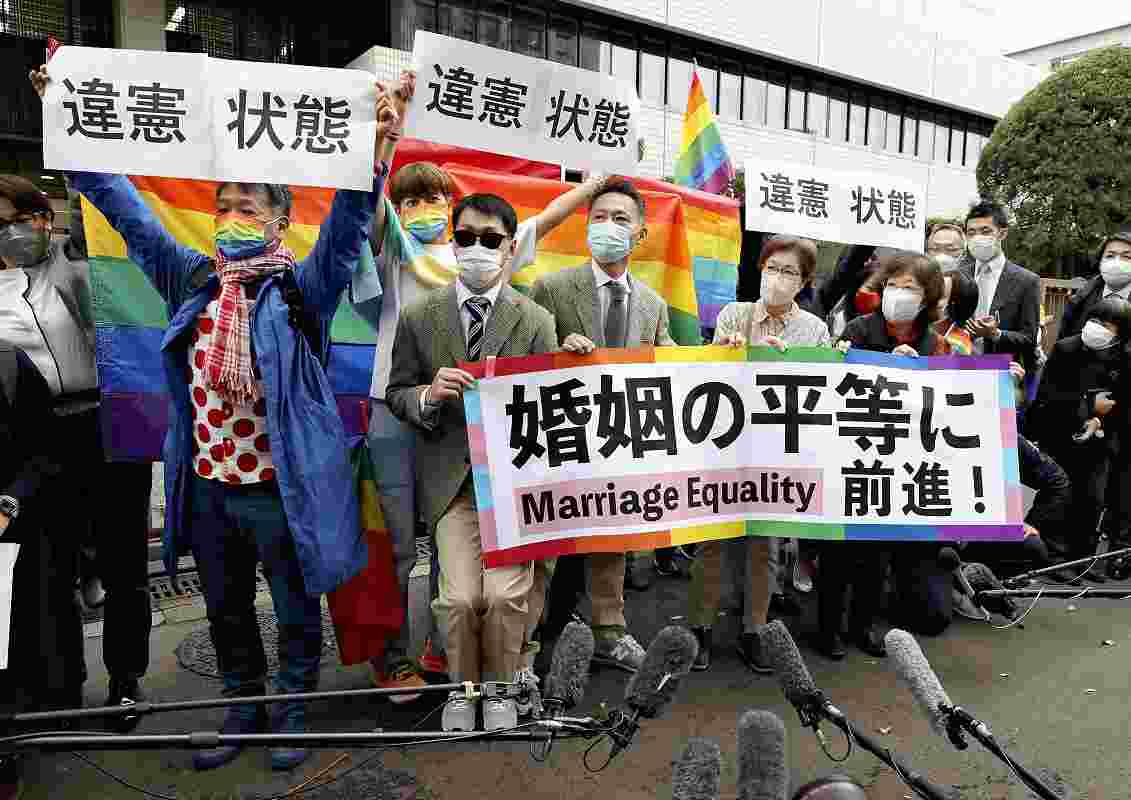Tokyo court: Legal provisions that don’t recognize same-sex marriage are constitutional

Plaintiffs hold banners reading “state of unconstitutionality” after the Tokyo District Court’s ruling on same-sex marriage in Chiyoda Ward, Tokyo, on Wednesday.
18:24 JST, December 1, 2022
Provisions in laws such as the Civil Code that do not allow same-sex marriage are constitutional, the Tokyo District Court has ruled, dismissing the demand for compensation in a suit filed by same-sex couples.
However, the court also said that from the standpoint of individual dignity, the lack of a legal system that recognizes same-sex couples and gives them benefits as a family is in a state of unconstitutionality.
The lawsuit was filed by couples in Tokyo and other areas seeking compensation from the central government. It is the third such suit filed with five district courts nationwide.
In the first ruling to be handed down in these cases, the Sapporo District Court concluded that the failure to recognize same-sex marriage was unconstitutional. However, the Osaka District Court deemed it constitutional in the second case to be ruled on.
The main issue in the lawsuits is whether the provisions of the Civil Code and the Family Registration Law that do not recognize same-sex marriage violate Article 24 and Article 14 of the Constitution.
Presided over by Judge Momoko Ikehara, the Tokyo court ruled Wednesday that the first paragraph of Article 24, which stipulates that “Marriage shall be based only on the mutual consent of both sexes,” refers to “marriage between opposite-sex couples and does not include same-sex marriages.”
The court also considered the first paragraph of Article 14, which guarantees people’s equality under the law, and concluded that the current system does not violate it.
Asserting that same-sex couples cannot obtain the legal benefits of marriage, such as the inheritance rights of spouses and joint parental rights for children, the court said in its ruling: “The reasoning that marriage is a heterosexual union is based on the fact that men and women have a long tradition of having and raising children. There are rational grounds for distinguishing between the permissibility and impermissibility of marriage.”
Based on this stance, the court then examined whether the current legal system violates the second paragraph of Article 24, which stipulates that “laws shall be enacted from the standpoint of individual dignity and the essential equality of the sexes,” regarding the choice of spouse and other family-related legal matters.
The court said in its ruling, “The legal benefits obtained through marriage and becoming a family are important personal benefits that concern individual dignity.”
Noting that sexual orientation cannot be changed by one’s own efforts or medical treatment, the court added: “It will become a serious threat or obstacle if a person can never become a family member with their partner as long as they live, simply because they are homosexual.”
The court also said a legal system similar to marriage could be introduced to allow same-sex couples to become legal families. It therefore ruled that the lack of such a system was in a “state of unconstitutionality.”
However, the court left the establishment of such a system to legislative discretion, saying the matter “should be fully discussed in the legislature, taking into account national traditions and public sentiment.” Therefore, the court concluded that the current legal provisions that do not recognize same-sex marriage could not be declared unconstitutional.
Focus differs among cases
The three court decisions so far have differed, and been focused on different elements.
In March last year, the Sapporo District Court focused on the legal benefits of marriage. It found that the lack of legal benefits that can be obtained through marriage, such as inheritance rights and joint custody of children, violates the Constitution because “not being able to obtain even a portion of these benefits constitutes discrimination.”
However, the court dismissed the plaintiffs’ demand for compensation, saying that social acceptance of same-sex marriage had a relatively short history and therefore the Diet could not have readily recognized the unconstitutionality of same-sex marriage.
In contrast, the Osaka District Court ruled in June this year that “the current system could become unconstitutional in the future, as a result of changes in social circumstances, if no measures are taken regarding a same-sex marriage system.”
However, it concluded the current system was constitutional on the grounds that the “partnership system” used by some local governments, which publicly recognizes same-sex couples, has been expanding, and that the differences in benefits with opposite-sex couples have been gradually resolved.
The Tokyo District Court focused on the aspects of family and individual dignity. The court ruled: “To become a family with one’s partner, receive legal protection and be recognized by society is an important matter that concerns individual dignity. This is the same for both opposite-sex and same-sex couples.”
Top Articles in Society
-

Man Infected with Measles Reportedly Dined at Restaurant in Tokyo Station
-

Man Infected with Measles May Have Come in Contact with Many People in Tokyo, Went to Store, Restaurant Around When Symptoms Emerged
-

Woman with Measles Visited Hospital in Tokyo Multiple Times Before Being Diagnosed with Disease
-

Australian Woman Dies After Mishap on Ski Lift in Nagano Prefecture
-

Foreign Snowboarder in Serious Condition After Hanging in Midair from Chairlift in Nagano Prefecture
JN ACCESS RANKING
-

Japan PM Takaichi’s Cabinet Resigns en Masse
-

Japan Institute to Use Domestic Commercial Optical Lattice Clock to Set Japan Standard Time
-

Israeli Ambassador to Japan Speaks about Japan’s Role in the Reconstruction of Gaza
-

Man Infected with Measles Reportedly Dined at Restaurant in Tokyo Station
-

Videos Plagiarized, Reposted with False Subtitles Claiming ‘Ryukyu Belongs to China’; Anti-China False Information Also Posted in Japan





















